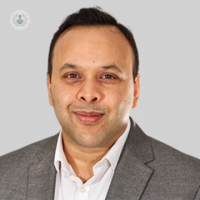A pain in the bottom: what can anal pain mean?
Written by:What do we mean by anal pain?
Pain is not a disease, pain is a symptom, and anorectal pain is the symptom for which about 50% of patients go to a colorectal specialist. The patient suffers from pain in the anal region, which may be in the anal canal itself or internally in the rectum, often making it difficult for the patient to make the differentiation. Other times the pain is around the anus, in the perianal region.
The characteristics and intensity of pain vary depending on the cause and the pain threshold of each individual; everyone perceives pain differently and expresses it differently. Additionally, there is an element of shame and sometimes taboo associated with pain in the anal area.

What can cause anal pain?
There are many processes that can trigger this symptom. There are organic causes due to a specific anatomical problems, and non-specific causes that are difficult to diagnose which give rise to what we call functional pains.
How do you get a diagnosis?
Many people associate anal pain with haemorrhoids but the subject is more complex than this. It should be noted, straight off, that uncomplicated haemorrhoids do not usually cause significant pain.
When pain is accompanied by obvious physical symptoms, the differential diagnosis includes haemorrhoidal disease including thrombosed piles, perianal abscess or sometimes anal fissure or even fistula. All of these conditions can be diagnosed clinically and treated accordingly.
The problem arises in the absence of an obvious physical findings. Diagnosis then requires appropriate questions to the patient and a proctological examination. For example, if the pain starts with defecation and increases after this for hours, diagnosis tends to an anal fissure although the patient cannot see it. There are also complementary examinations and in proctology we have the advantage of working with the terminal portion of the digestive tract that is open to the outside allowing easy access to endoscopic, ultrasonic or functional examinations.
What are functional pains?
Functional pains are a type of pain that do not correspond to any obvious anatomical cause, including an absence of physical injury in the patient. They can be difficult to diagnose and tend to be a ‘diagnosis of exclusion’. Functional anorectal pain is divided into two groups depending on the duration of the symptom:
- Chronic proctalgia, which is when the pain lasts for more than 20 minutes
- Proctalgia which is fleeting but evolves to peaks of pain that last from seconds to a few minutes
How is functional anorectal pain treated?
The treatment must always be according to the individual case. Although these pains may be related to psychological factors, we cannot assume this is the origin. Conventional analgesia is often ineffective. Postural treatments, peri-anal massages and even baths can be of great relief to patients. With regard to pharmacological treatments, muscle relaxants and tricyclic antidepressants are used, among others.
An interesting treatment is the re-education of the anal muscles and the pelvic floor by means of bio-feedback techniques, that allows good sphincter relaxation and easier defecation, all of which will contribute to improvement in these patients. In recent years, neuro-modulation of sacral roots or stimulation of the posterior tibial nerve have shown encouraging results.
If you're suffering with symptoms, you can schedule an appointment with Mr Sinha on his Top Doctors profile.


